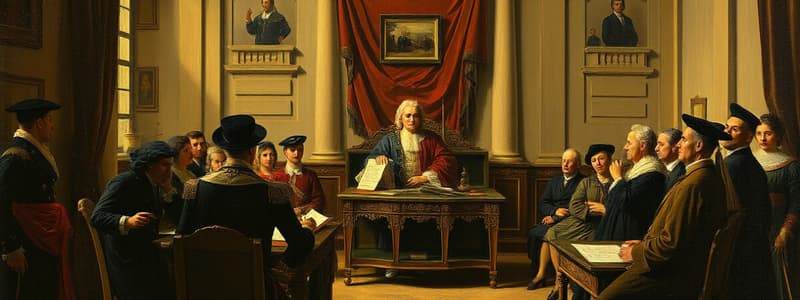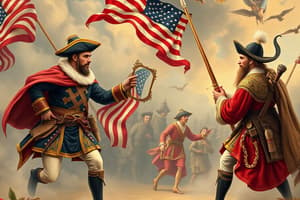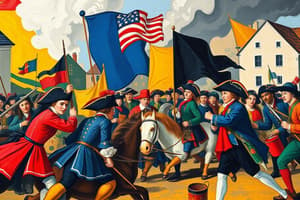Podcast
Questions and Answers
What is a monarch?
What is a monarch?
A monarch is the sovereign head of state.
Who was the monarch of England during the American Revolution?
Who was the monarch of England during the American Revolution?
King George III
How long did King George III rule for?
How long did King George III rule for?
1760-1820
What is a legislature?
What is a legislature?
What was Parliament?
What was Parliament?
What is a precedent?
What is a precedent?
Give an example of a precedent.
Give an example of a precedent.
What is common law?
What is common law?
Does common law work?
Does common law work?
What is a colony?
What is a colony?
Give an example of a colony.
Give an example of a colony.
What is a charter?
What is a charter?
Give an example of a charter.
Give an example of a charter.
Who was King George III?
Who was King George III?
What is a compact?
What is a compact?
What was the Mayflower Compact?
What was the Mayflower Compact?
What is mercantilism?
What is mercantilism?
Give an example of mercantilism.
Give an example of mercantilism.
What does it mean to boycott?
What does it mean to boycott?
What does it mean to repeal?
What does it mean to repeal?
Give an example of a boycott.
Give an example of a boycott.
Flashcards are hidden until you start studying
Study Notes
Monarch
- Sovereign head of state; King George III served as the monarch of England during the American Revolution.
- His reign lasted from 1760 to 1820.
Legislature
- Lawmaking body of a country or state responsible for creating laws.
Parliament
- The British legislature comprised nobles and church officials, advising King Henry III and governing the realm.
- Evolved to include common people representatives by the late 1300s.
Precedent
- A ruling from an earlier case that serves as a guideline for similar cases in the future.
- Example: A judge referencing a past trespassing case to inform their ruling.
Common Law
- A legal system based on court decisions and customs rather than legislative statutes.
- Foundations of modern laws regarding property, contracts, and personal injury are derived from English common law.
Colony
- A settlement controlled by a parent country located elsewhere, specifically seen in the American colonies established by England.
- Colonists maintained loyalty to England, embraced common law, and demanded representation in governance.
Charter
- A formal document that grants land and authority to create colonial governments.
- Example: The Virginia Company's charter for Jamestown, promising colonists the same liberties as those in England.
King George III
- British Monarch from 1760 to 1820 who enforced mercantilism, aiming to increase exports over imports.
- His actions led to heightened tensions, culminating in the First Continental Congress and the battles of Lexington and Concord. Seen as a "Tyrant" in the Declaration of Independence.
Compact
- An agreement or contract among individuals; the Mayflower Compact was a foundational document for governance among the Plymouth colonists.
- Established principles of self-governance and direct democracy through town meetings.
Mercantilism
- Economic theory positing that countries should sell more than they buy; Britain applied this policy to exploit colonial resources.
- Colonists were mandated to sell raw materials to Britain cheaply and buy British goods at inflated prices, harming colonial businesses.
Boycott and Repeal
- To boycott means to refuse to purchase certain goods as a form of protest; for example, colonists boycotted British tea.
- To repeal means to revoke or cancel a law; the boycott of the Stamp Act led to its repeal by Parliament.
Studying That Suits You
Use AI to generate personalized quizzes and flashcards to suit your learning preferences.




